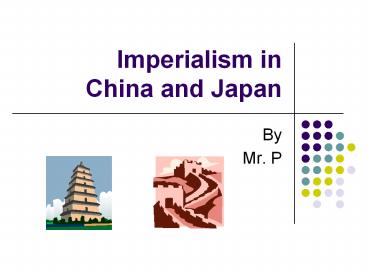Imperialism in China and Japan - PowerPoint PPT Presentation
1 / 14
Title:
Imperialism in China and Japan
Description:
Imperialism in China and Japan By Mr. P – PowerPoint PPT presentation
Number of Views:184
Avg rating:3.0/5.0
Title: Imperialism in China and Japan
1
Imperialism in China and Japan
- By
- Mr. P
2
China Trade
- China sold the British merchants SILK, TEA,
PORCELAIN, in exchange for GOLD and SILVER. - China was EXPORTING more than it imported which
made the British upset and so they wanted more
stuff. (1890s) - British wanted to expand markets to other
countries to feed the INDUSTRIAL MACHINE
Q How did British trade with China trigger the
Opium Wars? The British introduced Opium, when
the Chinese tried to stop the opium trade, the
British responded with gunboats.
3
DRUGS
- Opium contains approximately 12 morphine, an
alkaloid, which is frequently processed
chemically to produce heroin for the illegal drug
trade. The latex also includes codeine and
non-narcotic alkaloids such as papaverine,
thebaine and noscapine.
4
OPIUM WAR
- Opium grown in INDIA was traded for TEA
- SILVER was eventually used as payment for the
OPIUM. - Chinese government outlawed the drug.
- The Chinese govt. executed drug dealers.
- 1839 OPIUM WAR begins. (Britain refused to stop
selling)
British would smuggle in Opium from
India and trade it for
silver.
5
OPIUM WAR
- Unequal Treaties 1842 Britain made the Chinese
accept the TREATY OF NANJING. - Give up rights to western powers.
- Made them pay for war.
- Laws of the land do not apply to
- outsiders (extraterritoriality right)
- 4. Most favored nation clause, whatever
- rights you give another nation you need
- to give us.
- 5. Can trade in 5 ports.
Q How did the Taiping Rebellion and other
internal problems weaken the Qing dynasty?
Years of turmoil, power given to regional
leaders, weakened the Qing dynasty and made China
vulnerable to European encroachment.
6
Taipang Rebellion Massive flooding, tax evasion,
extravagant court cases, widespread corruption by
the rich in CHINA!
- Poverty and misery increased and they poor will
rise up from 1850-1864. Inspired by a
revolutionary teacher Hwong Chwahn. - He wanted a heavenly kingdom of great peace the
TAIPANG. - He was influenced by the teachings of western
missionaries.
7
TAIPANG REBELLION Could this happen in the US?
- Fight between Imperial China and Taipang Rebels.
- Effects 20-30 million dead, shared power with
regional governors and Russia seized lands in
Northern China.
Q How did reformers try to solve Chinas
internal problems? They tried to modernize,
incorporate Western technology, build industry,
and streamline government.
8
JAPAN 2 different approaches
- CHINA
- Imperialized by Britain
- Forced into foreign trade (opium)
- Signed treaty because lost Opium war
- Agreed to modernize after 2 wars
- Became weaker
- 1899Open Door policy to keep trade open for
everyone. They were fearful that American
merchants would get locked out. - RESISTED IMPERIALISM
- JAPAN
- Imperialized by US
- Asked to open country to trade
- Signed treaty out of FEAR
- Vowed to industrialize
- Sought out best imperialists Germanymilitary
Britishnavy - Became strong
- Convinced west to give up extraterritorial rights
- Imperialized Russia/China
- Transformed in POWERHOUSE!!
Q What caused the Qing dynasty to fall? The
Boxer Rebellion led to greater Westernization,
which led to nationalism, which combined with
discontent and a weak emperor to topple the
dynasty.
9
War with Japan
- In 1868 Japan decided to go to war with China.
- Japan took Taiwan from China and were dressed as
westerners at the treaty table. - They actually wanted more land but some countries
would not let them take it. - This was a disaster for China. China will resent
westerners.
Today China prefers Japanese made electronics and
things like pencils they prefer China goods.
10
Boxer Rebellion
- In 1899 a group of Chinese had formed a secret
society the righteous harmonious fists.
Westerners watched them train and dubbed them
BOXERS. - Goal was to drive out foreign devils.
- Polluting with telegraph, trains, and other NON
Chinese ways.
11
Boxer Rebellion
- The westerners responded to boxers attacks in
1900 by organizing a multinational force to crush
the boxers and rescue foreigners in Beijing.
12
BOXER REBELLION EFFECTS
- China had to reform
- Rushed women to school
- Stressed science and math
- More students were sent to study abroad
- China expanded ECONOMICALLY as well as mining,
trains, telegraphs, tobacco, soybeans, silk.
13
LONGTIME EFFECTS ON CHINA OF IMPERIALISM
- China Constitutional Monarchy and came up of 3
principles of the people - Nationalism pride in your country
- Democracy or representative government
- Livelihood or economic security for all Chinese.
14
- THE END

